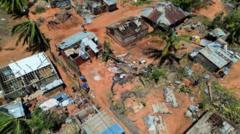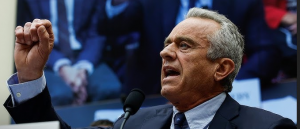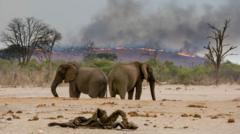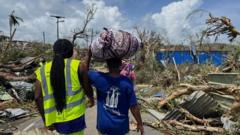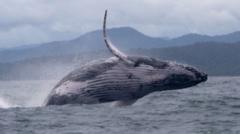During COP29 in Baku, tensions rise between fossil fuel advocates and climate change proponents, revealing a divided landscape on energy sources and climate policies.
Azerbaijan President Defends Fossil Fuels at COP29, Sparks Debate
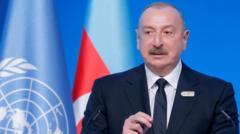
Azerbaijan President Defends Fossil Fuels at COP29, Sparks Debate
Azerbaijan's president asserts that oil and gas should not be criticized, while UN officials press for a shift to renewable energy amid mixed reactions.
Azerbaijan's President Ilham Aliyev addressed the ongoing COP29 climate conference by proclaiming that fossil fuels, particularly oil and gas, are a “gift of god.” He emphasized that nations possessing such natural resources should not be ostracized or blamed for tapping into them to meet market demands. In his speech, he denounced "Western fake news" that allegedly misrepresents his country's emissions, stressing that Azerbaijan contributes a mere 0.1% to global gas emissions.
While Aliyev enumerated the necessity and market demand for various natural resources, he framed Azerbaijan’s efforts to increase gas production by one-third in the next ten years as an economic imperative. The move prompted concerns from climate advocates about the implications of prioritizing fossil fuels amid a global push for cleaner energy alternatives.
Voices of dissent emerged prominently, especially from UN Secretary-General António Guterres, who criticized the commitment to fossil fuels as “absurd.” Guterres underscored the urgency of transitioning to renewable energies, asserting that the ongoing climate crisis demands immediate actionable efforts. He stated that countries must not leave COP29 without substantial guarantees for financial aid directed toward developing nations, which are critically impacted by climate change.
This year's conference has encountered scrutiny due to Azerbaijan's leadership and its ties to the fossil fuel sector. Critics highlight the potential for the conference to be leveraged as a platform for advancing the country's oil and gas interests rather than addressing global climate objectives.
As discussions continue, the role of wealthier nations in providing financial support to lower-income countries remains a pressing issue. Many leaders pointedly criticized the absence of some major emitters from the conference, including the U.S. and India, emphasizing the need for collective action to combat climate challenges effectively.
The intersection of these perspectives at COP29 illustrates the complexities facing global leaders as they navigate the balance between economic growth, natural resource exploitation, and the urgent necessity for climate action. With ongoing debates, the conference is set to last until November 22, leaving open the questions of negotiation, agreement, and the future of global climate policy.
While Aliyev enumerated the necessity and market demand for various natural resources, he framed Azerbaijan’s efforts to increase gas production by one-third in the next ten years as an economic imperative. The move prompted concerns from climate advocates about the implications of prioritizing fossil fuels amid a global push for cleaner energy alternatives.
Voices of dissent emerged prominently, especially from UN Secretary-General António Guterres, who criticized the commitment to fossil fuels as “absurd.” Guterres underscored the urgency of transitioning to renewable energies, asserting that the ongoing climate crisis demands immediate actionable efforts. He stated that countries must not leave COP29 without substantial guarantees for financial aid directed toward developing nations, which are critically impacted by climate change.
This year's conference has encountered scrutiny due to Azerbaijan's leadership and its ties to the fossil fuel sector. Critics highlight the potential for the conference to be leveraged as a platform for advancing the country's oil and gas interests rather than addressing global climate objectives.
As discussions continue, the role of wealthier nations in providing financial support to lower-income countries remains a pressing issue. Many leaders pointedly criticized the absence of some major emitters from the conference, including the U.S. and India, emphasizing the need for collective action to combat climate challenges effectively.
The intersection of these perspectives at COP29 illustrates the complexities facing global leaders as they navigate the balance between economic growth, natural resource exploitation, and the urgent necessity for climate action. With ongoing debates, the conference is set to last until November 22, leaving open the questions of negotiation, agreement, and the future of global climate policy.

